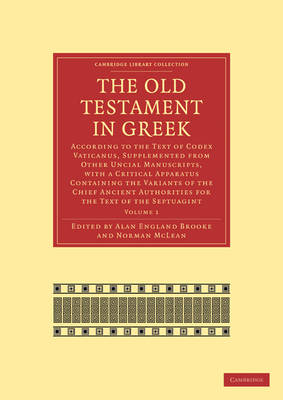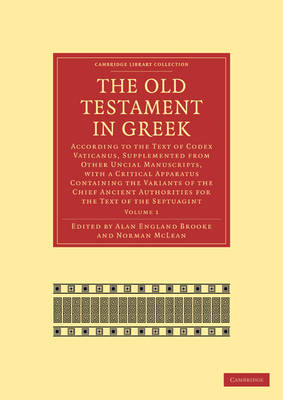
- Afhalen na 1 uur in een winkel met voorraad
- Gratis thuislevering in België vanaf € 30
- Ruim aanbod met 7 miljoen producten
- Afhalen na 1 uur in een winkel met voorraad
- Gratis thuislevering in België vanaf € 30
- Ruim aanbod met 7 miljoen producten
Zoeken
The Old Testament in Greek
According to the Text of Codex Vaticanus, Supplemented from Other Uncial Manuscripts, with a Critical Apparatus Containing the Variants of the Chief Ancient Authorities for the Text of the Septuagint
€ 50,45
+ 100 punten
Omschrijving
This incomplete, early twentieth-century edition was one of the first modern attempts to bring textual criticism to bear on the Septuagint, the Greek version of the Hebrew scriptures which originated in the third century BCE. It is still widely consulted today. Originally issued in nine parts between 1906 and 1940, this reissue is bound in four volumes. Volume 1 contains the books of Genesis, Exodus and Leviticus. Following Swete's smaller Septuagint (1887-1894) the running text is that of Codex Vaticanus (B) supplemented by Codex Alexandrinus (A) or another uncial when B is defective. The edition provides an extensive critical apparatus, taking account of numerous uncial manuscripts, fragments and palimpsests, over sixty cursive manuscripts, a sample lectionary, early daughter versions of the Septuagint, including the Armenian, Bohairic, Sahidic, Ethiopian, Old Latin, Palestinian Aramaic, and Syro-hexapla, and a wide range of Patristic quotations.
Specificaties
Betrokkenen
- Uitgeverij:
Inhoud
- Aantal bladzijden:
- 452
- Taal:
- Engels
- Reeks:
Eigenschappen
- Productcode (EAN):
- 9781108007023
- Verschijningsdatum:
- 25/02/2010
- Uitvoering:
- Paperback
- Formaat:
- Trade paperback (VS)
- Afmetingen:
- 210 mm x 297 mm
- Gewicht:
- 1075 g

Alleen bij Standaard Boekhandel
+ 100 punten op je klantenkaart van Standaard Boekhandel
Beoordelingen
We publiceren alleen reviews die voldoen aan de voorwaarden voor reviews. Bekijk onze voorwaarden voor reviews.







